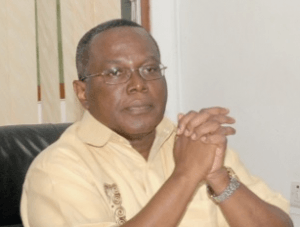Ghana’s 40-year development plan is non-political – NDPC

The National Development Planning Commission (NDPC), says the country’s long term development agenda spanning more than a 40-year period would bind successive governments without restricting any ruling political party.
The Commission stated that the growth strategy serves as a structure that allows any governing political party to formulate its activities in line with the national vision to guarantee consistent economic growth and infrastructure expansion.
The Director-General of the Commission, Dr Nii Moi Thompson stated this in a presentation made on his behalf at a symposium organised by law think tank Noble Law Group, on the theme: ‘’Laws that work, rethinking Ghana’s national development path.”
The presentation was on the topic: ”Ghana’s 40-year national development plan; prospects, implementation and sustainability.”
He explained that there would be 10 national elections, and that would witness four -year plans within the period for managers of the economy to articulate and build the kind of “ambitious infrastructure” expansion the country requires to spur growth and boost employment opportunities.
“Other countries follow through a consistent course of plan and they are where they are [developed]. The plan will not tie the hands of any particular political party, it only provides a framework within which the parties will develop their activities,” he said.
“Details will come from the government in power, the plan binds successive governments that is why we are doing a wide consultation, two people from each of the political parties involved in the development of their parties’ manifestoes are to be with us,” he added.
He said phase one of the consultation process has been concluded and covered various stakeholders including students, professional bodies, non-governmental organisations, political parties, faith-based organisations, traditional rulers and other identifiable groupings.
The Commission used the sessions to solicit divergent opinions for an inclusive plan, and has since the process received nearly 4,000 submissions nationally and abroad, Dr Isaac Mensah-Bonsu, Director of Planning and Coordination of the NDPC said.
“We need to have a policy that can direct multi-stakeholders so that we can have a consistent plan, but to ensure compliance of law and regulations people should be aware that the law can deal with them when they flout it,” he warned.
The Commission blamed a situation where large numbers of qualified senior high students are refused tertiary schools’ admission on lack of infrastructure due to absence of a national development plan.
It named University of Ghana for rejecting 39,000 qualified students in 2013, University of Cape Coast refusing admissions to 17,000 students in 2015, while University of Education turned away 16,979 in 2015, largely on grounds of acute infrastructure shortage.
“If we had planned perhaps their [students] destinies would have changed, we need to change our attitudes and values,” Dr Mensah-Bonsu said.
Ghana’s 40-year development plan was launched in 2015 and integrates the visions of the Sustainable Development Goals and the African Union’s agenda 2053.
Source: GNA
